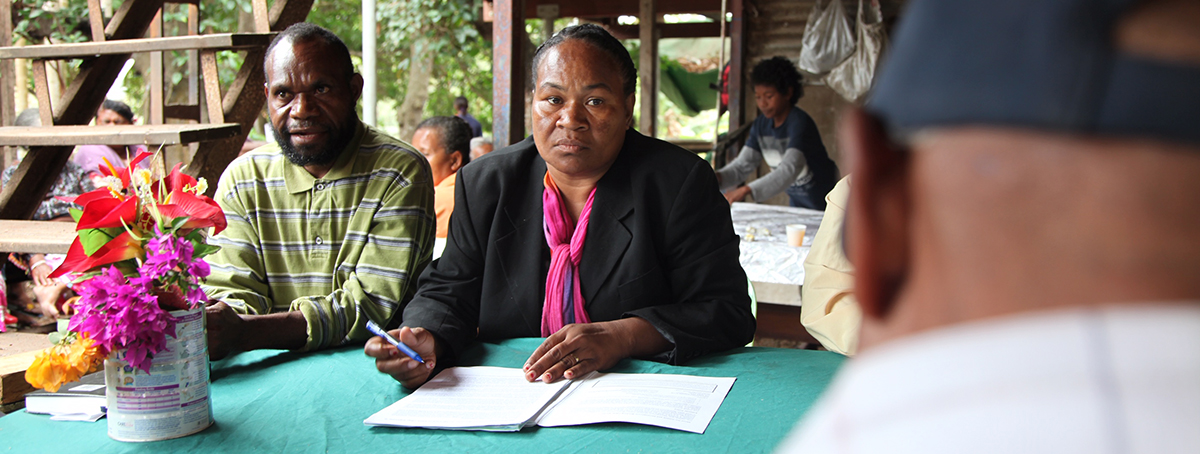Dr Melissa Demian
I am primarily a legal anthropologist, having spent most of my career researching different aspects of Papua New Guinea’s legal system, from the country’s village courts to its Constitution. In addition to my work on various aspects of law in the Pacific postcolony, I have at different points in my career researched and published on matriliny, child adoption, land disputes, domestic violence, local histories and temporalities in the service of ethnic identity formation, and the ‘cultural defense’ in criminal law. I continue to pursue both research and teaching on the appropriation of classic anthropological concepts to fit emergent legal dilemmas. My work in Papua New Guinea has led me to interrogate the basis for the custom/law distinction as a preface to questioning the bases on which culturalist legal claims – such as ‘cultural property’ or a ‘cultural defense’ – are made.
Research projects in preparation revolve around two themes. One is a redefinition of the geography of legal pluralism through investigating how introduced instruments of justice and reconciliation only partially reflect the multiple social orders people must negotiate as they mark the passage of time since the cessation of colonialism or violent conflict. The other is an exploration of how the revival of business co-operatives in Papua New Guinea may offer to urban women an opportunity to experiment with forms of ownership and economic independence that connect them to other women – in other words, a new “Melanesian way” by means of the co-operative business model.
Research information
Socio-legal studies, legal anthropology, property theory, temporality, Melanesia, gender, urbanisation, co-operatives and mutualism.
Selected publications
Single-authored book
Under revision. In Memory of Times to Come: Ironies of History in Southeastern Papua New Guinea.
Refereed journal articles
2017. Making women in the city: notes from a Port Moresby boarding house. Signs: Journal of Women in Culture and Society 42(2): 403-425.
2016. Court in between: the spaces of relational justice in Papua New Guinea. Australian Feminist Law Journal 42(1): 13-30.
2015. Dislocating custom. PoLAR: Political and Legal Anthropology Review 38(1): 91-107.
2014. On the repugnance of customary law. Comparative Studies in Society and History 56(2): 508-536.
2008. Fictions of intention in the ‘cultural defense’. American Anthropologist 110(4): 432-442.
2007. Canoe, mission boat, freighter: the life history of a Melanesian relationship. Paideuma: Mitteilungen zur Kulturkunde 53: 89-109.
2006. Reflecting on loss in Papua New Guinea. Ethnos 71(4): 507-532.
2003. Custom in the courtroom, law in the village: legal transformations in Papua New Guinea. Journal of the Royal Anthropological Institute 9(1): 97-115.
2000. Longing for completion: toward an aesthetics of work in Suau. Oceania 71(2): 94-109.
Chapters in edited volumes
Forthcoming. (With B. Rousseau) Owning the law in Melanesia. In The Melanesian World, E. Hirsch and W. Rollason (eds). London: Routledge.
2015. Being a village court magistrate in Papua New Guinea. In A World of Work: Imagined Manuals for Real Jobs, I. Gershon (ed). Ithaca, NY: Cornell University Press.
2013. When we were in darkness: the hazards of knowing history on the Suau Coast. In Melanesia: Art and Encounter, N. Thomas, L. Bolton, E. Bonshek, J. Adams, and B. Burt (eds). London: British Museum Press.
2011. ‘Hybrid custom’ and legal description in Papua New Guinea. In Recasting Anthropological Knowledge: Inspiration and Social Science, J. Edwards and M. Petrović-Šteger (eds). Cambridge: Cambridge University Press.
2007. ‘Land doesn’t come from your mother, she didn’t make it with her hands’: challenging matriliny in Papua New Guinea. In Feminist Perspectives on Land Law, H. Lim and A. Bottomley (eds). London: Routledge-Cavendish.
2007. (With S. Wastell) Creative appropriations and institutional contexts. In Creativity and Cultural Improvisation, E. Hallam and T. Ingold (eds). Oxford: Berg.
2006. ‘Emptiness’ and complementarity in Suau reproductive strategies. In Population, Reproduction and Fertility in Melanesia, S.J. Ulijaszek (ed). New York: Berghahn Books.
2004. Seeing, knowing, owning: property claims as revelatory acts. In Transactions and Creations: Property Debates and the Stimulus of Melanesia, E. Hirsch and M. Strathern (eds). New York: Berghahn Books.
2004. Transactions in rights, transactions in children: a view of adoption from Papua New Guinea. In Cross-Cultural Approaches to Adoption, F. Bowie (ed). London: Routledge.
2004. Disputing damage versus disputing ownership in Suau. In Rationales of Ownership: Transactions and Claims to Ownership in Contemporary Papua New Guinea, L. Kalinoe and J. Leach (eds). Wantage: Sean Kingston Publishing.
Policy and other publications
2015. Sorcery cases in Papua New Guinea’s village courts. In Brief 2015/27. State, Society and Governance in Melanesia, Australian National University.
2014. Overcoming operational constraints in Papua New Guinea’s remote rural village courts: a case study. In Brief 2014/52. State, Society and Governance in Melanesia, Australian National University.
2014. Innovation in Papua New Guinea’s village courts: exceeding jurisdiction or meeting local needs? In Brief 2014/24. State, Society and Governance in Melanesia, Australian National University.
2012. Viva Gluckman! or, case studies in the classroom. In Focus commentary with contributions from students in December thematic (‘Law’) issue of Anthropology News, American Anthropological Association.
2010. JLA Forum: ‘Community’ at the expense of ‘kinship’ in British courts. Journal of Legal Anthropology 1(2): 229-234, 243-246. Feature image: Linda Rau from Kila Kila Village Court, PNG, resolves disputes and builds understanding of issues, particularly those affecting women.
Photo by DFAT

